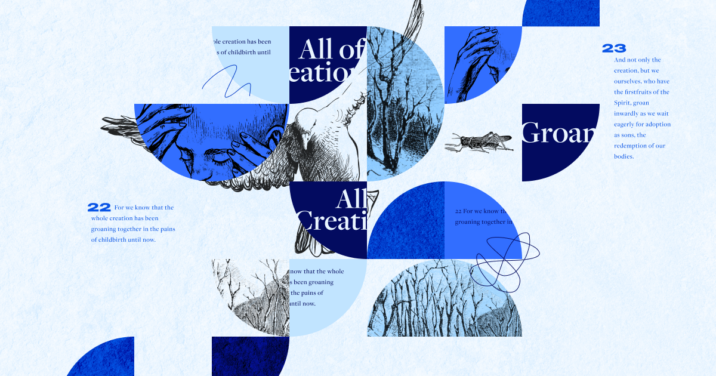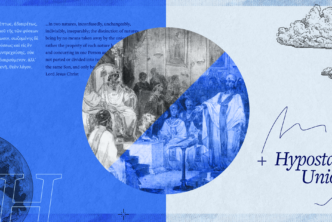Creation is there, and it is not silent. The heavens declare the glory of God (Ps 19:1), the floods lift up their voice (Ps 93:3), the rivers clap their hands (Ps 98:8), and the mountains praise the Lord (Ps 148:9). But amid the shouting and rejoicing of the heavens and the earth, you can hear another sound. Creation groans.
Why does it groan? How does it? And when, if ever, will creation’s groaning end?
The claim of all creation groaning
In Paul’s masterful letter to the Romans, the beloved eighth chapter reflects on grand truths such as our life in Christ, our identity as God’s adopted children, our hope for what God will bring to pass when Christ returns, and the inability of anything in or beyond this wide world to separate us from God’s love.
The apostle wrote that “the sufferings of this present time are not worth comparing with the glory that is to be revealed to us” (Rom 8:18). A tension exists between present sufferings and future glory. We do not yet see this glory, for it must be revealed at the appointed time. This present time consists of present sufferings, and during them we need a real and present hope for something that transcends the aches and agonies of living in a Genesis 3 world.1
We long, therefore, for the fulfillment of God’s promises—that the dead will be raised, the righteous vindicated, the wicked condemned, and creation made new.
The heavens do declare the glory of God, but the wicked deeds of his image-bearers declare something as well: the corruption of sin and the shadow of death that pervade this creation. Given the condition of creation, Paul told the Romans that we’re not the only ones longing for what is to come. “For the creation waits with eager longing for the revealing of the sons of God” (Rom 8:19). Indeed, “the whole creation has been groaning together in the pains of childbirth until now” (8:22).
All creation groans.
The reason for the “fors”
In order to rightly rejoice in the truths Paul is teaching the Romans (and us), we need to think about conjunctions. When Paul says that “creation waits with eager longing” (Rom 8:19) and that “the whole creation has been groaning” (8:22), each of these verses begins with the conjunction “for.”
Paul says that our future glory will surpass our present sufferings, and the greatness of this glory is substantiated with a conjunction: “For the creation waits with eager longing for the revealing of the sons of God” (Rom 8:19). Why should we believe that an incomparable glory is coming for us? Because creation longs to see it. What a great glory this must be if the creation itself is anticipating it!
The “revealing of the sons of God” will occur at our bodily resurrection. The resurrection of the dead is revelatory, because the people of God will be raised imperishable. For now we outwardly waste away. Both the wise and the fool die. Graveyards fill up with the righteous and the unrighteous. But one day, when we rise with new bodies, we will reveal something important to creation. Our status as God’s children has been inaugurated already, of course, at our new birth—and this status will be confirmed with a new body when the Lord Jesus returns to raise the dead. Our body will be new in the sense that we are raised unto physical immortality—glorified.2 The revealing of the sons of God will occur at our resurrection and glorification.
The reason why creation eagerly awaits this revealing is explained in Romans 8:20–21—and notice the next “for”:
For the creation was subjected to futility, not willingly, but because of him who subjected it, in hope that the creation itself will be set free from its bondage to corruption and obtain the freedom of the glory of the children of God.
Paul is connecting the ideas of longing and liberation. Creation waits for the revelation of the sons of God because such revelation will mean the liberation of creation from corruption.
So far we’ve seen that Paul’s words in Romans 8:20–21 explain what he says in 8:19. He tells us why creation eagerly longs for the revelation of God’s children. Now let’s consider the next verse and how it relates to what precedes. The “for” that begins 8:22 is also explaining 8:19. In 8:22 Paul says, “For we know that the whole creation has been groaning together in the pains of childbirth until now.”

As we connect Romans 8:22 to 8:19, the logic works like this: a reason we know that the creation waits eagerly for the revealing of the sons of God (8:19) is that the whole creation has been groaning in the pains of childbirth to this very moment (8:22). The groans signal the eagerness.
The nature of the groaning
Are the groans of creation good or bad? If we injure ourselves and groan in pain, the groans indicate that something isn’t right. If we experience emotional exhaustion and groan in weariness, the groans are the outer lament of our inner state.
But groans don’t only have to mean lament. If you’re watching your favorite sports team play in a high-stakes game, you might groan with anticipation and engagement. Your investment in the game can take an audible form. If you’re looking forward to call from a friend, you might wait with your phone nearby and verbally express your eagerness.
According to Romans 8:22, all creation groans. But what causes these groans? To get some clarity about these groans, let’s to look at what precedes and follows this verse.
Notice that in Romans 8:19, “the creation waits with eager longing.” And in 8:23, “not only the creation, but we ourselves, who have the firstfruits of the Spirit, groan inwardly as we wait eagerly for our adoption as sons, the redemption of our bodies.”
Before we read about creation groaning in Romans 8:22, Paul says that creation “waits with eager longing” in 8:19. We can put together the notions of groaning and eagerly awaiting. This pairing is confirmed when we get to 8:23, which uses the phrase “groan inwardly as we wait eagerly.” According to Romans 8:19–23, God’s people groan and eagerly await, and creation groans and eagerly awaits.
In Romans 8:19–25, groaning is marked by anticipation. The groans are not pure lament, though life in a Genesis 3 world involves much that is lamentable. The groaning in Romans 8 is hope-shaped. Believers are waiting for “the redemption of our bodies” (8:23). We don’t yet have or even see our bodily redemption, which is why we hope for it. “For who hopes for what he sees? But if we hope for what we do not see, we wait for it with patience” (8:24–25).
Waiting with patience for our bodily redemption is a posture of faith. And it’s a faith that comes with groans, not because we doubt the promises of the Lord but because we eagerly await their glorious fulfillment.
In the pains of childbirth
Thinking of the groans in Romans 8:22 as anticipatory is suggested by the verse’s graphic depiction of pains. The “groaning together in the pains of childbirth” is about travail or agony, but the suffering of birth pains does not persist. As in the tension of present sufferings and future glory in 8:18, the pains of childbirth are followed by the joy and delight of the baby coming into the world.
Creation groans, but these are not the groans of total despair. The agonies of a fallen world mean that we lament, but the promises of our faithful God mean that we lament with hope. Creation groans because things aren’t the way they’re supposed to be, but these groans are hopeful because things aren’t the way they’re going to be.
The Lord does not turn his ear from the groans of creation. He hears them, just as surely as he hears the clapping rivers and shouting hills, just as surely as he heard the Israelites when they were in Egypt.
During those many days the king of Egypt died, and the people of Israel groaned because of their slavery and cried out for help. Their cry for rescue from slavery came up to God. And God heard their groaning. (Exod 2:23–24)
All creation groans for rescue, these groans have come up to God, and God has heard them. Rescue will mean redemption, and redemption on a cosmic scale. When Christ returns, he shall come with the answer to creation’s patient waiting. And the answer for our bodies and for the world we inhabit is one word: glory.
Groaning for glory
Romans 8:19–25 interweaves what creation waits for and what believers wait for. This truth is evident in 8:21 where we read that “the creation itself will be set free from its bondage to corruption and obtain the freedom of the glory of the children of God.” The children of God will enter a state of bodily freedom when Christ raises them from the dead. They will be raised to behold and reflect the glory of God. They will be glorified.
Creation waits eagerly for the liberation of our bodies because then, by the same power of Christ that will raise us from the grave, its liberation will follow.3 Creation “will be set free from its bondage to corruption.” The apostle explained what brought about this bondage: “Creation was subjected to futility, not willingly, but because of him who subjected it” (Rom 8:20). This report is probably Paul’s restatement of what happened in Genesis 3.
In Genesis 3:17–19, the Lord told Adam,
Cursed is the ground because of you; in pain you shall eat of it all the days of your life; thorns and thistles it shall bring forth for you; and you shall eat the plants of the field. By the sweat of your face you shall eat bread, till you return to the ground, for out of it you were taken; for you are dust, and to dust you shall return.
The cursed ground in Genesis 3 represents a world in bondage to corruption in Romans 8. Plants, animals, and people do not last—they age, wither, and die. Hard work and abundant resources cannot ultimately prevent the inevitable: death in the dust (Eccl 3:19–20).
In a Genesis 3 world, what does creation want? Creation wants blessing to flow afresh on the cursed ground, life to conquer corruption and decay, and shalom to fill creation like the waters cover the sea.
Creation groans for glory, for glorification. And creation eagerly awaits the redemption of our bodies—for our liberation from the grave will usher in a wider liberation affecting the heavens and the earth, a liberation so profound and with such far-reaching implications that John the apostle called it “a new heaven and a new earth.” The first heaven and the first earth, he said, will pass away (Rev 21:1).
Non-human creation
Since Paul wrote about the groaning of people as distinct from the groaning of creation (Rom 8:22–23), he must mean creation in the sense of nonhuman creatures and nonliving things. This implication is important, because rivers don’t actually clap and hills don’t actually shout. But the psalmists—and Paul in Romans 8—use the literary device we call personification, applying personal attributes or actions to something nonpersonal.
In Romans 8:22, Paul said that “the whole creation has been groaning together in the pains of childbirth until now.” He’s attributing faith-fueled and hope-shaped groans to nonhuman creation.
This personification accomplishes at least two things. First, it establishes continuity between God’s image-bearers and the rest of creation with regard to the problem: we are all affected by the curse and corruption of sin and death. Second, it establishes continuity between God’s image-bearers and the rest of creation with regard to the solution: we need redemption and glorification.4
The ruin and futility that sin has brought into the world is a predicament of epic proportions. The problem has both spiritual and material dynamics, so the solution must impact the spiritual and the material. The remedy to the bondage and decay of sinners and their world is not a remedy that merely restores, however. Glorification is not just restoration. It is resurrection and transformation. It is a move not backward but onward, toward the telos—the end—for which God made creation.5
The believer, along with creation, groans for shalom, for the peace and wholeness for which we were created. But we groan by faith and not by sight. These groans won’t last forever. Our hope will be fulfilled because God will not fail. So for now we wait eagerly, but we don’t wait alone. Every mighty stream, every shining star, every gushing wind, and every square foot of earth is declaring the glory of God and groaning for glorification.
Related articles
- Every Person an Icon: Why Creation Signifies Dignity for All
- Genesis and Primeval History, Part 1 of 2: Three Falls from Paradise
- For a meditation on the content of Genesis 3 in the context of the biblical canon, see Mitchell L. Chase, Short of Glory: A Biblical and Theological Exploration of the Fall (Wheaton: Crossway, 2023).
- For more on the biblical hope of resurrection from the dead, see Mitchell L. Chase, Resurrection Hope and the Death of Death, Short Studies in Biblical Theology (Wheaton: Crossway, 2022).
- G. K. Beale: “The resurrection of God’s people in Romans 8:18–23 appears to be the catalyst in some sense for the rest of the new creation coming into being,” A New Testament Biblical Theology: The Unfolding of the Old Testament in the New (Grand Rapids: Baker Academic, 2011), 257.
- According to Christopher Morgan and Robert Peterson, “The work of Christ is so magnificent and efficacious that it not only defeats our spiritual foes and redeems God’s people but also redeems the creation” (The Glory of God and Paul: Texts, Themes and Theology, New Studies in Biblical Theology [Downers Grove: IVP Academic, 2022], 61).
- As T. Desmond Alexander put it, “nature and humanity will be in harmony as God originally intended. When this happens, the earth will be very different, for God’s disfavour and curses will be removed,” From Eden to the New Jerusalem: An Introduction to Biblical Theology (Grand Rapids: Kregel Academic, 2008), 163.







